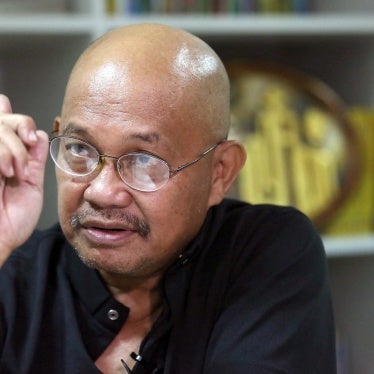This week, a Philippine court convicted 2 prominent activists – 1 of them a sitting member of congress – and 11 teachers at an Indigenous school on charges related to child abuse after they allegedly exposed several children to danger during what the defendants called a “rescue mission” in 2018. The case may be one of several involving politically motivated charges against activists as the government fights the longstanding communist insurgency in the country.
In its verdict, the court in Tagum City upheld the prosecution’s argument that the defendants, led by Representative France Castro and former Representative Satur Ocampo, violated the country’s child abuse law when they took 14 students from an Indigenous school in Talaingod town in Davao del Norte province and brought them to the adjacent province of Compostela Valley (now Davao de Oro).
The defendants said they were conducting a “national humanitarian mission” because the children and their educators feared being caught in ongoing military operations in the area against the communist New People’s Army (NPA). The prosecution accused the defendants of failing to coordinate with local officials and failing to get parental consent, thus exposing the children “to harm or risk” during the three-hour trek through the mountains.
Prosecutors originally charged the defendants with child trafficking, kidnapping, and child abuse but later on dropped the other two charges. The defendants are out on bail but could face up to six years’ imprisonment if an appeals court upholds the conviction.
In a statement, the military praised the verdict, saying it would deter groups from “luring youths” to the insurgency. The Philippine National Security Council echoed that view, even as various activist groups denounced the decision.
The military had asserted the school was being used as a “training ground” for rebels. The government has attacked and closed down several Indigenous schools in recent years, with their leaders and educators accused of being communist rebels or sympathizers of the NPA – a practice known as red-tagging – and other forms of harassment, as well as extrajudicial execution.
Any case involving allegations of child abuse should be adequately investigated and prosecuted on its merits, and should not be used for the judicial harassment of activists suspected of being communists. Several of these charges have been proven to be bogus, prompting the Supreme Court to rule in May against red-tagging. The conviction and imprisonment of activists can set a dangerous precedent against advocates and civil society.










